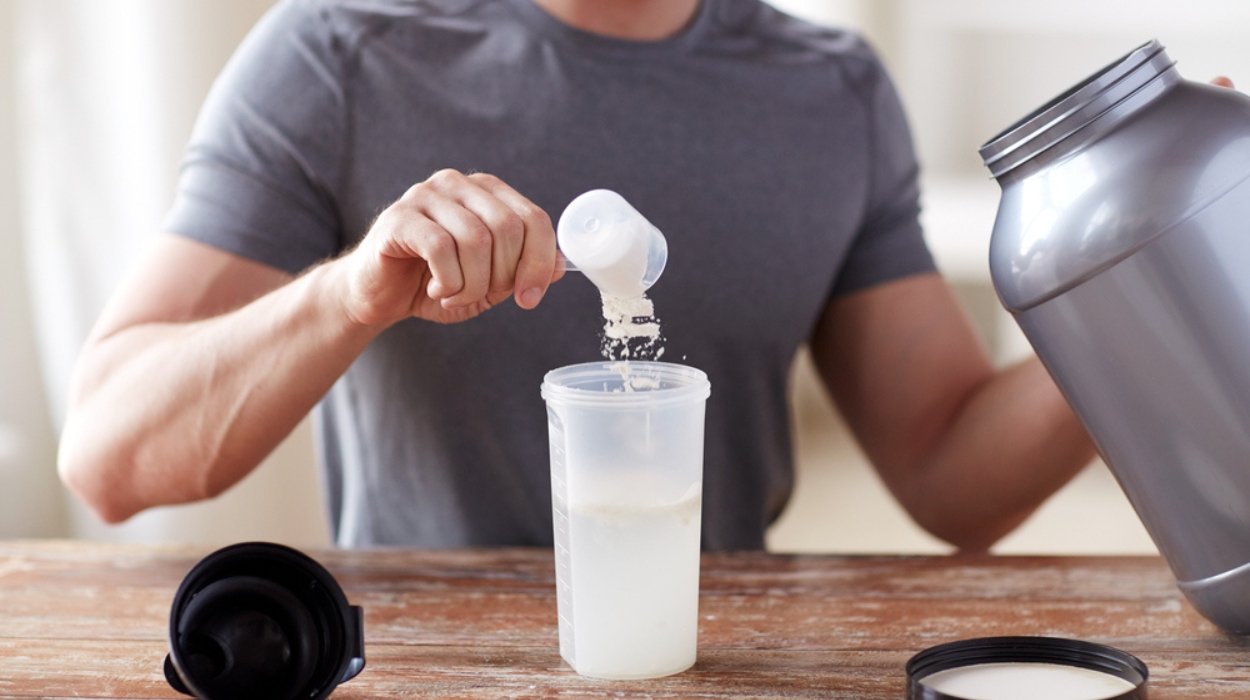Creatine is an amino acid that is key to adenosine triphosphate (ATP) production. In turn, ATP provides energy for muscle contraction. Creatine supplements help provide your muscle cells with the raw materials they need to use energy effectively and replenish that energy after exercise.
Scientific evidence has shown that creatine supplements may also support brain health[1] and cardiovascular wellness,[2] too!
However, creatine is best known for its capability to help increase muscle mass and support exercise performance. Fitness enthusiasts have sworn by creatine supplements for decades, and research supports[3] the conclusion that creatine, combined with resistance training exercises, is an effective regimen for healthy adults to boost muscle growth and repair.
Creatine use can have side effects. For example, many users have noticed that their face looks puffy when they take creatine. Does creatine make your face fat? Can you prevent changes to your facial appearance from creatine?
Does Creatine Make Your Face Fat?
Yes, it can in some cases. Taking creatine supplements increases water retention throughout the body, which can cause facial puffiness. These 5 tips may help decrease facial bloating from creatine supplementation.
- Decrease your sodium intake.
- Avoid processed foods.
- Stay hydrated.
- Stick to lower doses of creatine.
- Use creatine monohydrate instead of other types of creatine supplements.
The good news is that facial puffiness from taking creatine is usually temporary and will wear off if you decrease your creatine intake or stop taking it.
Does Creatine Make Your Face Fat?
Creatine supplementation doesn’t actually increase facial fat. However, taking creatine can lead to facial puffiness caused by temporary water retention.
One of the ways creatine may help support muscle cells is by improving hydration to the muscle tissue. Unfortunately, the water retention that occurs while taking creatine can lead to extra water weight and even make it seem as if you are gaining weight.
The tissues of your face are not exempt from the bloating that can come with taking creatine. Although it does not actually increase the amount of facial fat you have, if you have noticed facial puffiness, especially during the initial loading phase of your creatine regimen, you are not alone!
How Does Creatine Affect Your Face?

Does creatine make your face look chubby? Creatine can make your face look a little bloated because of water retention. The good news is that the puffy face many people notice from taking creatine is usually temporary and can be controlled with a few simple adjustments.
On the other hand, serums containing creatine have been tested[4] and shown to reduce the appearance of wrinkles and other signs of aging. So while creatine supplementation may affect your face negatively in some ways, it could potentially enhance your facial appearance in others!
How To Avoid Facial Bloating While Taking Creatine?
Your body weight may initially increase any time you start building muscle, regardless of whether you are taking creatine or not. Because creatine also causes water retention, many people notice bloating and facial puffiness, especially because many people take a higher dose initially, during what’s known as the “loading phase.”
You may be able to avoid changes to your facial appearance due to temporary water retention with a few simple adjustments. Many of the same approaches for how to lose face fat in general may also help your face look leaner while you let a creatine supplement work to help you build muscles and get fit.
First, instead of taking a higher initial creatine dosage, skip the loading phase and start out at what would be your maintenance dose. You will still get the benefits of creatine supplementation for muscular growth and repair, not to mention the benefits to your neurological and vascular health![5]
You can also help prevent bloating by making sure to drink enough water. It may be counterintuitive, but being under hydrated can make you retain more water.
The type of creatine[6] you take may make you more likely to retain water. In general, creatine monohydrate is considered a safe, effective supplement that has not been shown to cause severe water retention.
Importantly, facial puffiness from creatine supplementation is generally temporary and may have a lot to do with your creatine dose. Taking too much creatine can make bloating worse and make it harder to stop taking creatine. If you are worried about side effects from creatine, talk to your healthcare provider or a registered dietitian for guidance.
Conclusion
Creatine may make your face look puffy due to water retention. Staying hydrated, reducing your creatine dose, and taking creatine monohydrate instead of other types of creatine supplements may help reduce facial puffiness.
Frequently Asked Questions
Creatine may increase the appearance of excess facial fat because of water retention, especially in the initial stages of creatine supplementation. However, you may be able to avoid the appearance of a puffy face with a few careful adjustments.
No. Creatine helps build muscle by increasing hydration in the muscle tissue and speeding up muscle recovery and repair. Bulking has more to do with the type of exercise you do and whether you are eating a calorie surplus.
Creatine supplementation can support your efforts to change your overall body composition by helping you build muscle mass and improving exercise performance. The type, duration, and consistency of your activity, coupled with a calorie deficit or surplus, will determine whether that results in a leaner or bulkier appearance.
Creatine doesn’t directly enhance fat burning. What it does do is enhance athletic performance and boost the results of high intensity exercise, especially resistance training. However, building muscle mass will boost your metabolism and lead to better fat burning, so creatine can help you lose body fat indirectly.
Not on its own. While creatine supplements help your muscles benefit more from resistance training and may lead indirectly to increased fat loss, the appearance of abs will result from a sustained calorie deficit and sticking to a strict healthy diet while controlling bloating.
If you have been taking too much creatine, you may experience creatine supplement dependence, meaning it will take a while for your body to start making enough of its own creatine again. You may experience fatigue and muscle weakness for a while. However, avoiding higher doses can help prevent unpleasant side effects from stopping creatine supplementation.
 Evidence Based
Evidence Based
